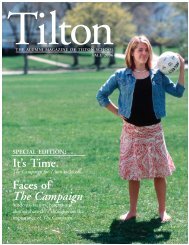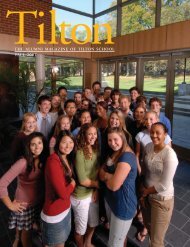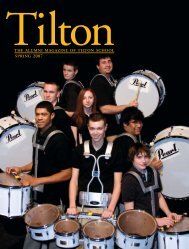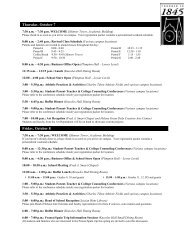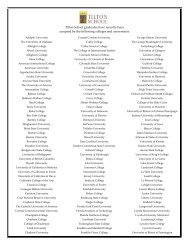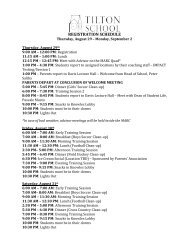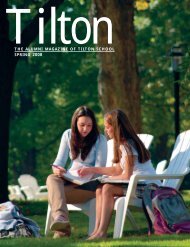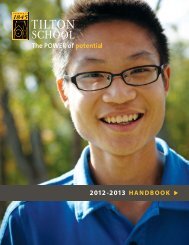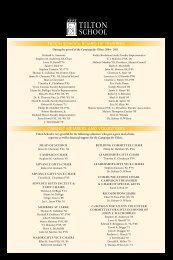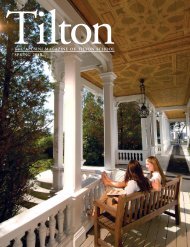the power of potential - Tilton School
the power of potential - Tilton School
the power of potential - Tilton School
You also want an ePaper? Increase the reach of your titles
YUMPU automatically turns print PDFs into web optimized ePapers that Google loves.
in all aspects <strong>of</strong> <strong>the</strong>ir daily lives and relationships and should reflect a sense <strong>of</strong> dignity in<br />
times <strong>of</strong> struggle as well as in times <strong>of</strong> success.<br />
For more information regarding <strong>the</strong> National Honor Society and <strong>the</strong> Cum Laude Society,<br />
please consult The <strong>Tilton</strong> <strong>School</strong> Handbook online.<br />
Advanced Placement Courses<br />
<strong>Tilton</strong> <strong>School</strong> includes a number <strong>of</strong> Advanced Placement (AP) classes in its academic<br />
curriculum. The Advanced Placement program <strong>of</strong> <strong>the</strong> College Board represents an<br />
opportunity for high school students to take high-quality, rigorous academic courses at a<br />
level equivalent to <strong>the</strong> first year <strong>of</strong> college. As recommended by <strong>the</strong> College Board, <strong>Tilton</strong>’s<br />
AP courses receive <strong>the</strong>ir AP designation by following <strong>the</strong> content and curricular goals<br />
outlined in <strong>the</strong> AP course descriptions. For information regarding AP Exams and AP course<br />
eligibility, consult The <strong>Tilton</strong> <strong>School</strong> Handbook online.<br />
Special Academic Opportunities<br />
Students are encouraged to maximize <strong>the</strong>ir learning experience at <strong>Tilton</strong>. In some cases,<br />
it may be advantageous to move beyond <strong>the</strong> standard curriculum, thus, students are<br />
allowed to pursue independent studies, Masterworks, internships and <strong>of</strong>f-campus learning<br />
opportunities. For more information on <strong>the</strong>se options, consult The <strong>Tilton</strong> <strong>School</strong> Handbook<br />
online or meet with Dr. Allen.<br />
Withdrawal from Courses<br />
No student may withdraw from a course without <strong>the</strong> approval <strong>of</strong> <strong>the</strong> Academic Dean,<br />
following <strong>the</strong> recommendation <strong>of</strong> <strong>the</strong> teacher and advisor. Students may request<br />
withdrawal from a year course or a semester course prior to <strong>the</strong> start <strong>of</strong> <strong>the</strong> fourth week<br />
without penalty and with no record <strong>of</strong> withdrawal on <strong>the</strong>ir permanent record. After <strong>the</strong>se<br />
times, <strong>the</strong> Academic Dean may grant withdrawals only in exceptional situations, but a<br />
notation <strong>of</strong> WP (withdrew passing) or WF (withdrew failing) will appear in <strong>the</strong> student’s<br />
permanent record. The Academic Office does not consider grades <strong>of</strong> WP or WF in<br />
determining students’ averages. The <strong>School</strong> awards no partial credit when students<br />
withdraw from a course. Students who withdraw from a course after <strong>the</strong> withdrawal<br />
deadline to lighten <strong>the</strong>ir academic load are not eligible for <strong>the</strong> honor roll for <strong>the</strong> marking<br />
period in which <strong>the</strong> withdrawals took place.<br />
Change <strong>of</strong> Course Schedule<br />
The Academic Dean must approve any and all changes to a student’s course schedule. The<br />
student should obtain a change <strong>of</strong> schedule form from <strong>the</strong> Academic Dean after fully<br />
discussing <strong>the</strong> proposed change with his/her advisor and teachers. No schedule change will<br />
take effect until <strong>the</strong> Academic Dean, having received <strong>the</strong> completed form and approved <strong>the</strong><br />
changes, notifies <strong>the</strong> teachers involved.<br />
RESIDENTIAL LIFE<br />
<strong>Tilton</strong> <strong>School</strong>’s residential curriculum is a student-centered program designed to promote<br />
mutual respect, personal integrity and personal growth in a safe, friendly and nurturing<br />
environment. The goal <strong>of</strong> <strong>the</strong> curriculum is to provide a safe, clean, courteous, cooperative<br />
and enjoyable residential experience made up <strong>of</strong> students and faculty who value, embrace<br />
and practice <strong>the</strong> virtues <strong>of</strong> responsibility, integrity, honesty, independence, acceptance,<br />
unselfishness and empathy.<br />
Dean <strong>of</strong> Students Rick Johnson is also <strong>the</strong> Director <strong>of</strong> Residential Life. Please contact Mr.<br />
Johnson with any questions or concerns about <strong>the</strong> Residential Life Program.<br />
Residential Community Responsibilities<br />
Although <strong>the</strong> <strong>School</strong> provides cleaning services in support for residential bathrooms,<br />
lobbies, hallways, etc., students are encouraged to take ownership <strong>of</strong> <strong>the</strong>ir living space.<br />
They should contribute to <strong>the</strong> well being <strong>of</strong> <strong>the</strong> community by participating in <strong>the</strong><br />
residential cleanliness for each dormitory. This requires all residents to alternately perform<br />
simple, daily chores (emptying trash cans, vacuuming hall floors, removing recyclable<br />
materials, etc.) that contribute to <strong>the</strong> good <strong>of</strong> <strong>the</strong> community as a whole.<br />
Specific Dormitory Responsibilities<br />
• Students must keep <strong>the</strong>ir dormitory rooms clean and neat at all times. The<br />
expectations are that all trash is removed, <strong>the</strong> floor is vacuumed, closets are<br />
neat and clean, bed sheets are clean, articles <strong>of</strong> clothing are put in <strong>the</strong>ir proper<br />
places, and desks are organized to promote effective study habits.<br />
• Students must work with <strong>the</strong> dormitory staff and student proctors in<br />
maintaining common areas, including bathrooms, lounges, hallways,<br />
stairwells, etc.<br />
• Room decorations must be in good taste and cannot display explicit, <strong>of</strong>fensive<br />
or demeaning material(s) in regard to race, religion, ethnic origin, gender or<br />
sexual orientation. Materials depicting drugs or alcohol are forbidden. All<br />
room decorations are subject to approval by <strong>the</strong> dormitory head, Director <strong>of</strong><br />
Residential Life and Dean <strong>of</strong> Students. No tacks, staples, nails, etc. may be<br />
used to hang items in dormitory rooms.<br />
• Furniture must remain in <strong>the</strong> dormitory rooms. Furniture must be kept in<br />
good repair and arranged so that <strong>the</strong> entire room is visible from <strong>the</strong> doorway<br />
and <strong>the</strong> entrance/exit is unobstructed by any free-standing item. Students<br />
may not dismantle furniture, nor tamper with any permanent fixtures in <strong>the</strong>ir<br />
rooms or in common areas.<br />
• Fire apparatus and sprinkler pipes must be kept clear.<br />
18<br />
19



